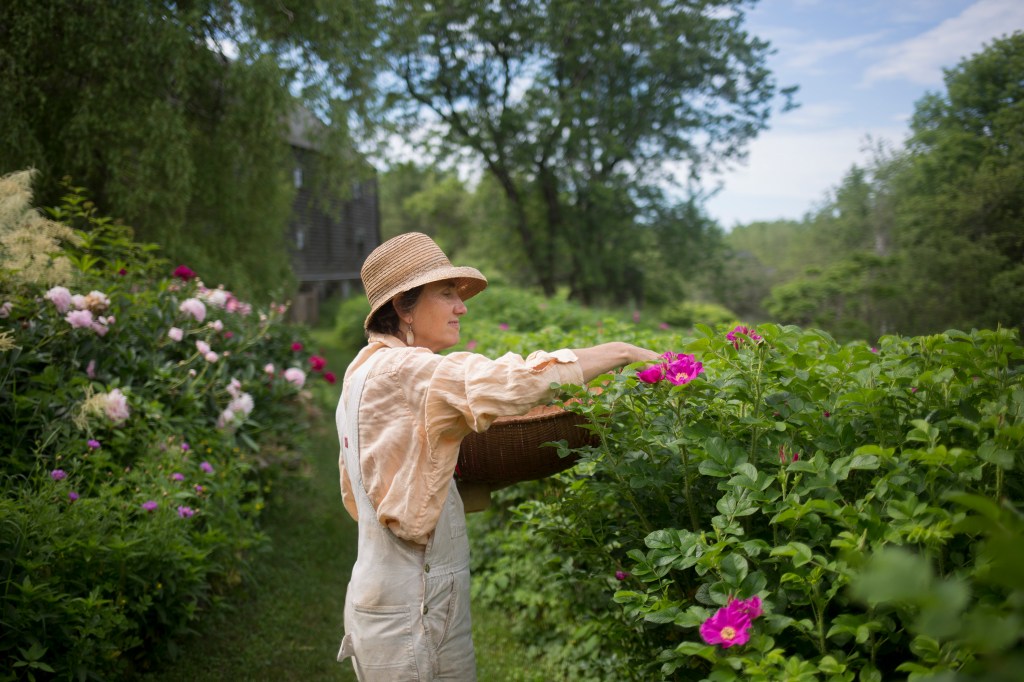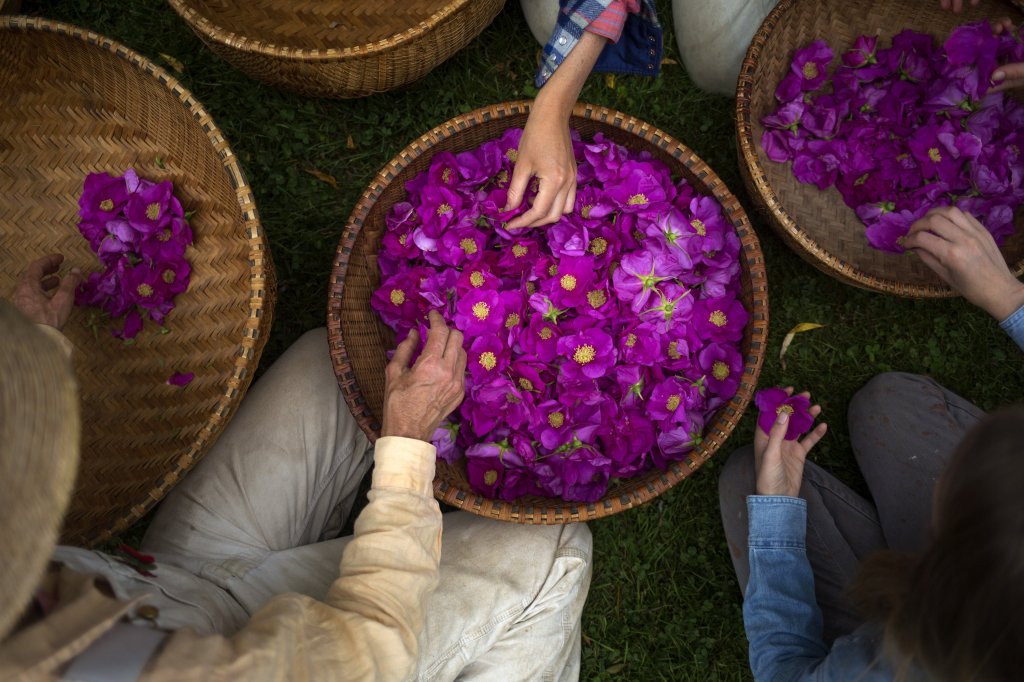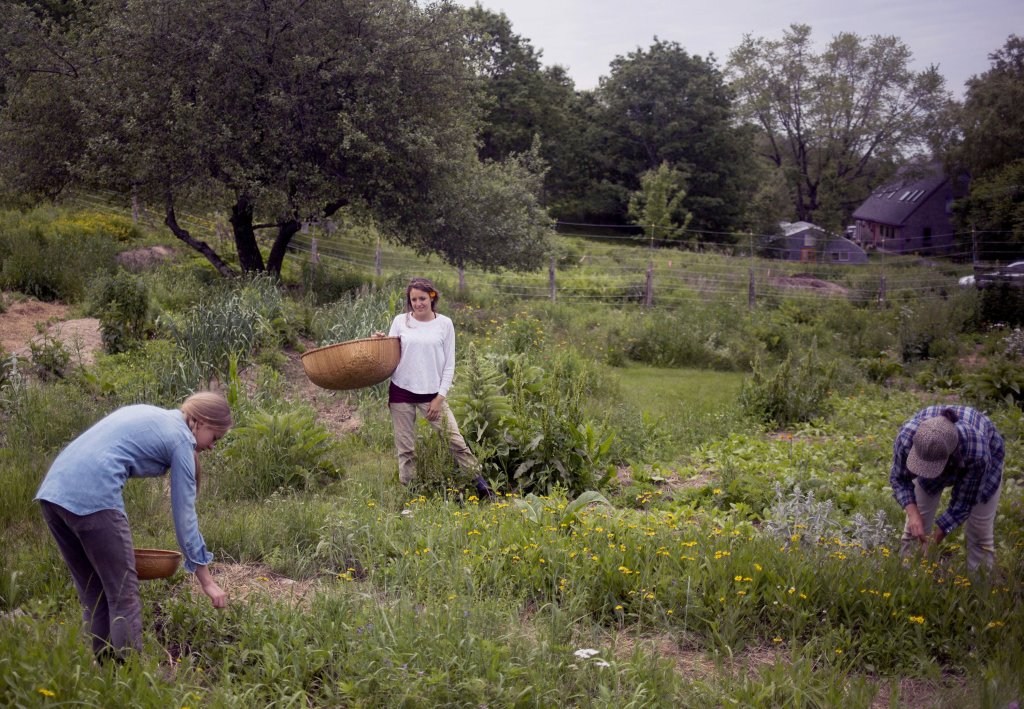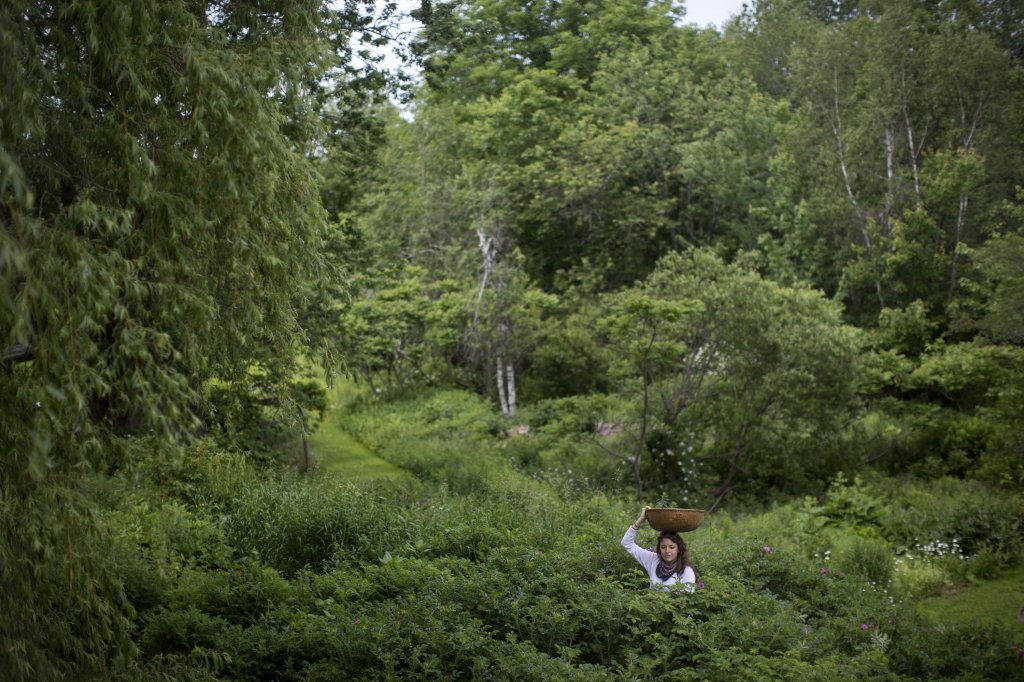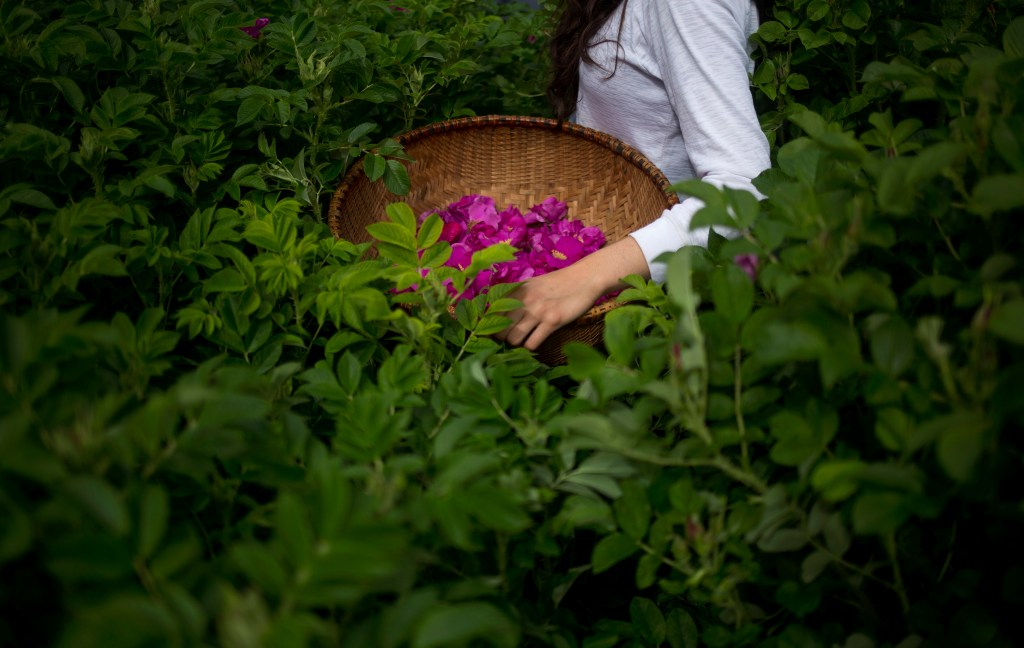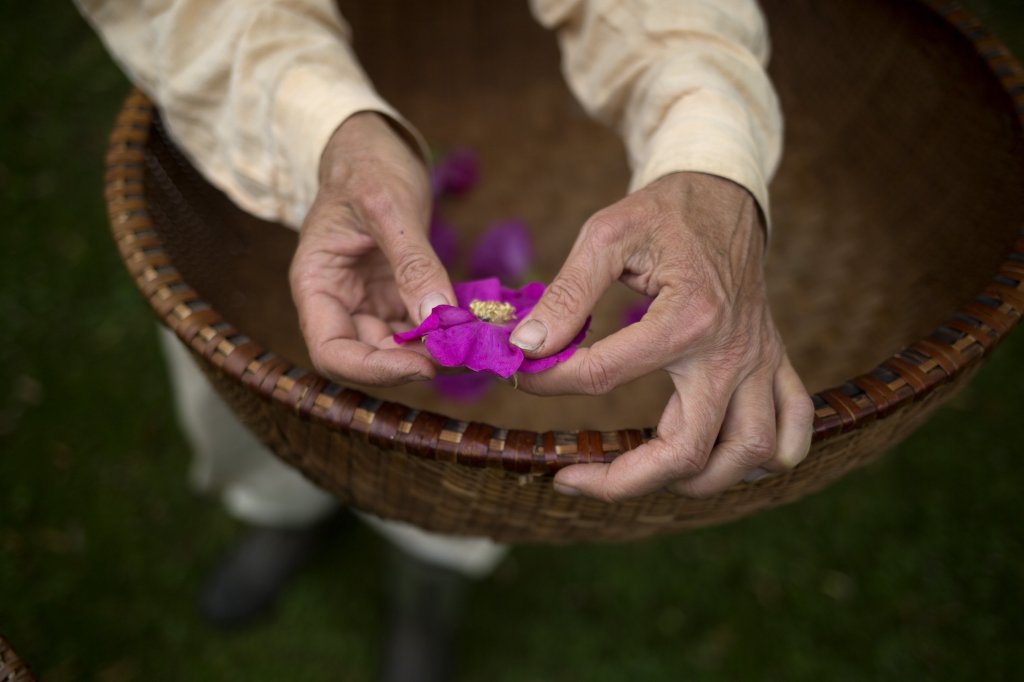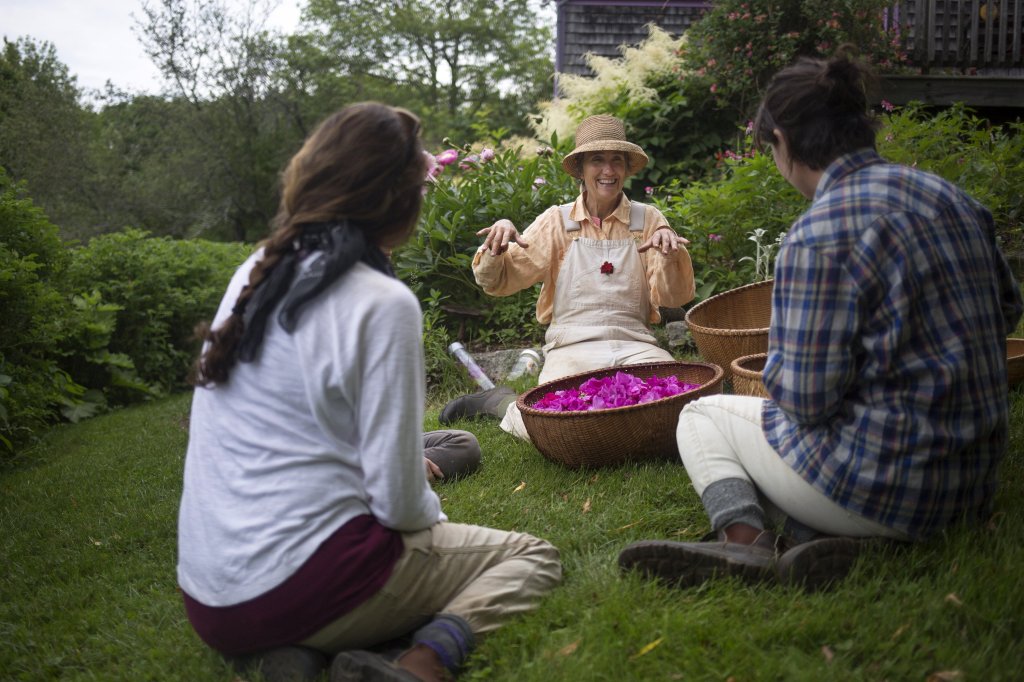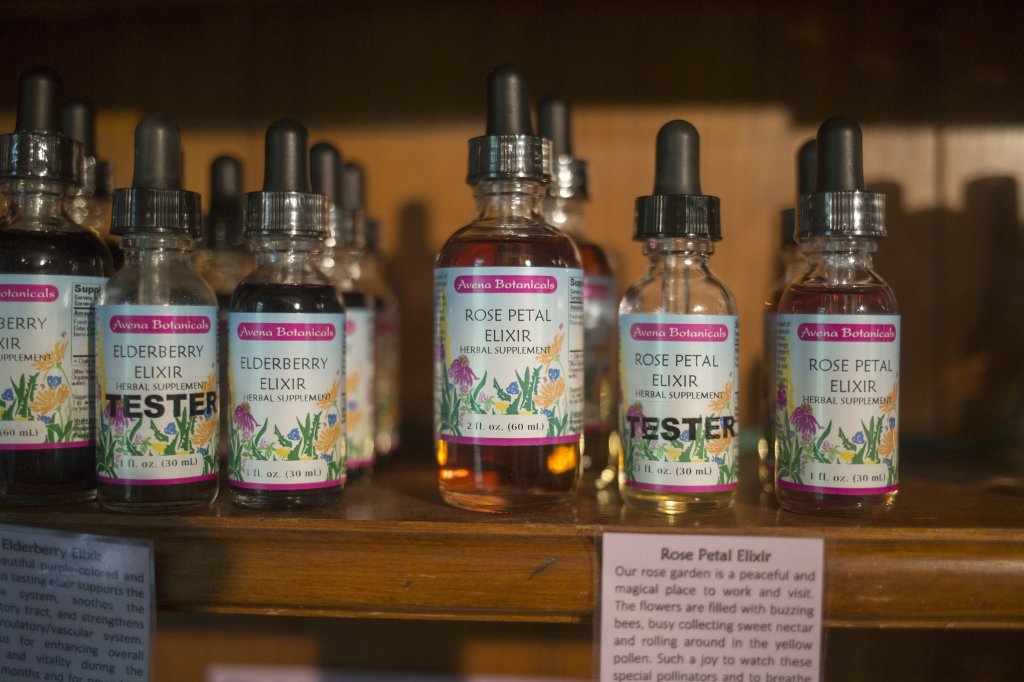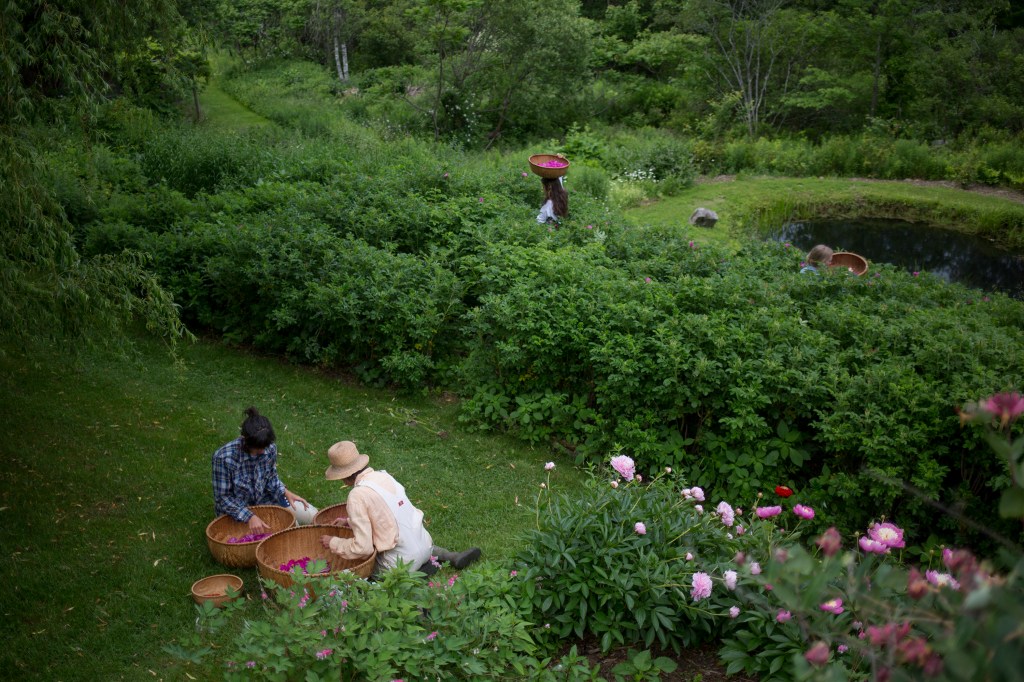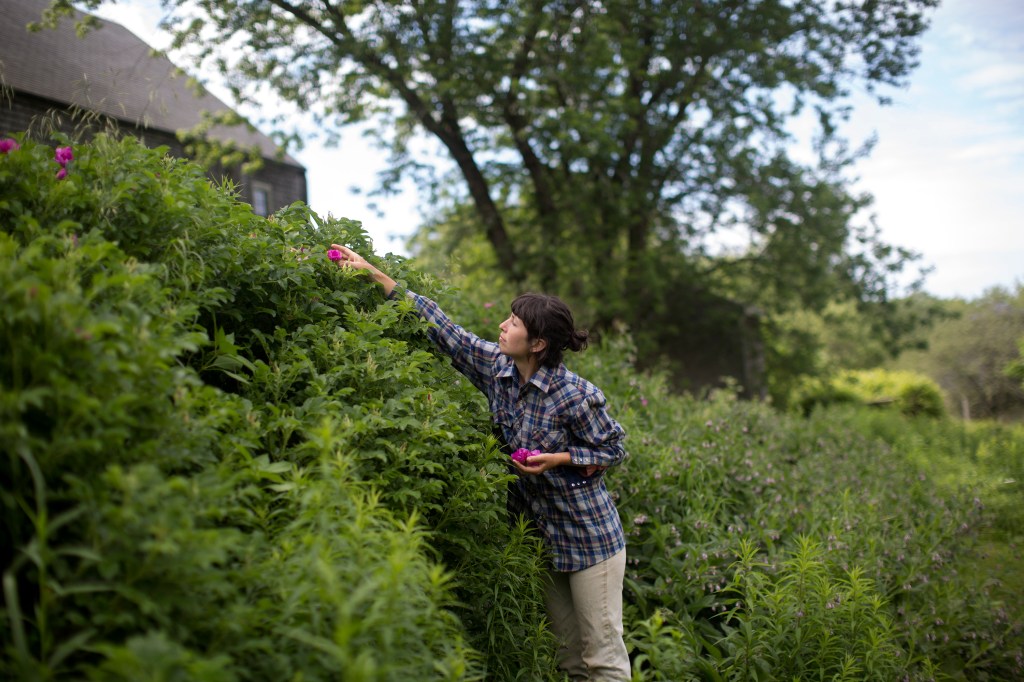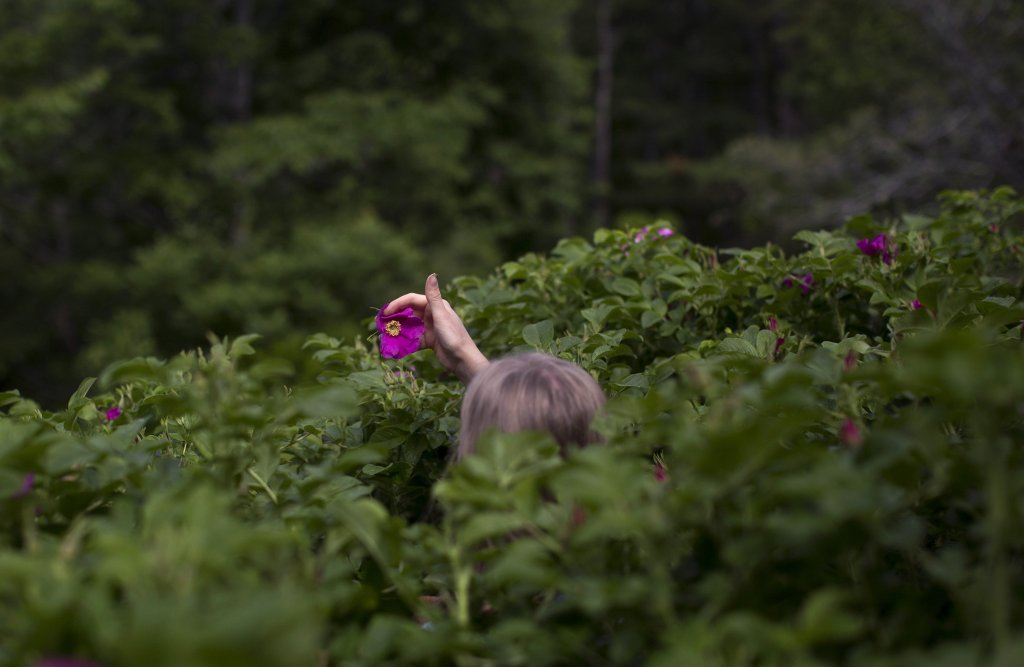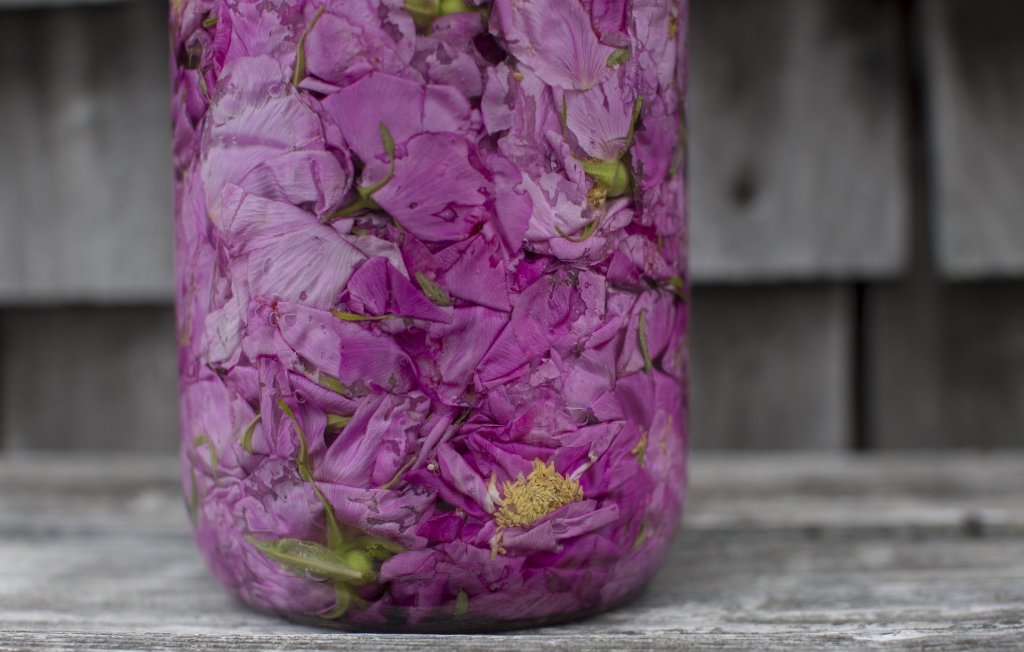ROCKPORT — The first indication that agriculture is practiced differently on a biodynamic herbal farm is the ritual before the rose petal harvest. Farmer Deb Soule, the founder of Avena Botanicals, sits quietly on the grass next to the hedgerow of rosa rugosa. It’s a cool morning and the petals are just opening. A trio of harvesters wait nearby, holding flying saucer-sized baskets. Soule is meditating and giving a silent thank-you to the rosa rugosa, which stretch about 40 feet away from her and are at least 5 feet wide.
When she feels that the time is right, she begins the harvest and the others follow, tenderly taking only the open roses, whole, with their yellow middles, and placing them in the baskets where they sit, like bright pink fried eggs over perfectly easy. The season for this crop runs about three weeks and will result in about 40 pounds of rose petals in the brightest of pinks. They’ll be distilled or dried and turned into various herbal concoctions: rose petal elixir, rosewater spritzer, a tea called “peaceful heart.”
The sounds of pollinators – from bees to hummingbirds – fill the air. A bird’s nest, likely a robin’s, is found in the thickest part of the hedgerow and the harvesters give it a wide berth. A chipmunk waltzes by within a foot of Soule and it seems quite possible that it will perch on her knee, Walt Disney-style.
Avena Botanicals, one of Maine’s oldest herb farms and its first certified biodynamic farm of any kind, is a serious business, producing over 1,000 pounds of herbs every growing season and more than 300 different species on three lush acres. But it’s also the agricultural equivalent of a soul spa, capable of making someone feel, setting foot on the property, as if they have just had a massage or fallen under a spell. Soule, a Maine native who has been exploring herbal remedies since she was a teenager in the 1970s, is the presiding queen of the magic. Other herb farmers describe her as an icon and an inspiration.
“She kind of crosses barriers from earthliness almost into fairyland,” said Lauren Pignatello of Swallowtail Farm, another herb farmer and herbalist who runs Milk and Honey Cafe in Portland. “She has that otherworldly energy.”
Soule rolls a few bright marbles in her hand and mentions that she keeps a basket of them nearby so she can hide them in secret places around the garden. “I like to make a simple offering.” That would be to the plants, and to, she says, the fairies who make the gardens grow. She means the team of gardeners (there are three on staff) but for a moment, maybe because of the hypnotic powers of the sweet haze of rosa rugosa, you might think she was talking about less corporeal fairies. And that seems almost reasonable.
A G-MAN AT THE DOOR
If this is a fairy tale, then the Food and Drug Administration plays the role of the Big Bad Wolf. Soule would rather not talk about Avena’s yearslong struggle to make this otherworldly place compliant with very matter-of-fact federal regulations. “I’m tired of that story,” she said. But it is an intriguing one, a cautionary tale for small businesses and a testament to how much Soule wanted to keep Avena Botanicals going.

One of the buildings on the Avena Botanical farm. Deb Soule started the biodynamic farm 22 years ago, on a piece of land in Rockport that had once been a chicken and sheep farm. Staff photo by Brianna Soukup
In 2013 Soule noticed “an interesting-looking man” on one of her herbal walks and talks, which she gives periodically throughout the growing season. She thought little of it, but three months later he returned in official garb, with a badge and, eventually, some bad news about how Avena runs its business. The director of the FDA’s New England District Office, Mutahar Shamsi, outlined Avena Botanicals’ violations of the Federal Food, Drug and Cosmetic Act in a 2014 letter. The list was long, but Soule was cited for describing various extracts, including Black Cohosh Root Liquid Extract, in therapeutic terms reserved for drugs. Lines like this one about black cohosh, being “traditionally used for easing muscular pain … and for relieving asthma,” were among the violations. If these were drugs, they’d have to be approved by the FDA. They were misbranded, the FDA said, and furthermore, they were not being prepared or packed under proper manufacturing practices established by the Dietary Supplement Health and Education Act of 1994.
In an email, an FDA official described the matter today as “an open compliance matter, which means there’s very little I’m able to share specific to Avena Botanicals.” The email went on to give general answers about FDA procedures to specific questions, such as whether inspections are ongoing, or if the matter is resolved.
The Health and Education Act is a controversial piece of legislation that some see as protective of consumers, while others believe it is too soft on the side of the industry that makes supplements like protein powders. For an herbalist like Deb Soule, who works only with natural ingredients, it is clearly galling to be lumped in with manufacturers promising bigger muscles in 30 days.
“Tinctures don’t belong in the same kind of category as protein powders,” she said.
Avena has national and even international reach through online sales, but the bulk of its sales are concentrated in the Northeast region. Average prices range from $6 to $20, depending on the product. The company declined to provide annual sales figures, citing privacy.
‘WITHOUT LIMITATION’
Soule felt scapegoated, which, for a woman who appears almost prenaturally calm, had to be upsetting. The FDA letter included an order to take “prompt” action. “Failure to promptly correct these violations may result in enforcement action, with further notice, including, without limitation, seizure and/or injunction.”
There was an implied supposition that she was not doing right by the people who lined up to buy everything from her face lotion to her Milk Thistle Seed Liquid Extract. At this point, Soule had been studying herbs for the better part of 40 years.
Soule’s family started Paris Manufacturing, which made items like wooden folding chairs and sleds. Growing up, she’d roamed the woods and trails of South Paris with her grandmother, Katherine Morton Soule, who taught her to identify birds by emphasizing song over names. As a teen, Soule became fascinated with an aging neighbor, Bernard McLaughlin, who had begun planting gardens in 1936 and became something of a Miss Rumphius-style figure, with lilacs substituted for lupines. He had more than 100 varieties of lilac in his garden; today those gardens are open to the public and known as the McLaughlin Garden & Homestead. Soule used to slip in to his garden and watch McLaughlin at work, admiring, for instance, how he worked with a wheelbarrow. “I still think of him when I use a wheelbarrow,” she said.

Stephanie Cesario harvests roses in the garden at Avena Botanicals. Cesario is the garden production coordinator and has worked at the biodynamic farm with Deb Soule since April. Staff photo by Brianna Soukup
Books, including some by European herbalists, influenced her as well. Her very first one, “Common Herbs for Natural Health,” by Juliette de Bairacli Levy, was a gift from herbalist Mary Bove, another Maine native who is director of medical education at Gaia Herbs in North Carolina. Soule attended the College of the Atlantic, spending a semester in Nepal, working with traditional healers and Buddhist teachers.
“My education did not come from the internet,” she said.
She studied with a California woman named Karyn Sanders and an ethno-botanist, Rocio Alarcon, who deepened her knowledge of and appreciation for plants.
“I also learned from both of those women how to be a good human being,” she said.
MOON SHADOW
She founded Avena Botanicals at age 26 (she’s 58) but didn’t move to her current location until 1995. There was just a farmhouse then, with two mature willows nearby and then “one big open field.” The farm had been a chicken and sheep farm in the 1800s, but was completely overgrown. A few ancient apple trees that dot the property are about the only signs of the old homestead.

Kaela van Breevoort Reed harvests Rosa rugosa in the Avena Botanicals garden. Staff photo by Brianna Soukup
It seems as though Avena has to have been there more than 22 years, based on how integrated the gardens Soule designed and planted are into the landscape. But the babbling brook that cascades over the rocks and into a retention pond is woman-made, and was added only a few years ago. Hawthorn trees that tower overhead in a circle around her first garden, the sanctuary, were barely up to her shoulder when planted. Since early in her career she’s been fascinated with biodynamic farming (see sidebar), which is a lot like organic farming, but incorporates added elements as the phases of the moon and a strict composting system involving surprising ingredients, including dandelions). Avena wasn’t certified as such until 2011, but Soule has been practicing those methods for years.
Soule started the farm with four very specific intentions, she said: to create a botanical sanctuary for a diversity of medicinal plants; to feed pollinators and birds; to create a living classroom (she even has a nonprofit called the Herbal Classroom); and finally, to teach others how to garden and prepare herbal remedies. Back then she would have used the word “medicine,” but she chooses her words carefully these days; “medicine” is not a word the FDA wants her using. She’d teach anyone who comes to the farm looking for knowledge; even the FDA inspector who came to her herb walk in 2013 would have been welcome as a student.
Almost all the materials that go into Avena products, except for things like olive oil, grow on the Rockport farm. “Seventy percent of what we produce comes from these gardens,” Soule said.
“You don’t get much purer than what comes off this farm,” she added.
CROSSING T’s, DOTTING I’s
In the movies, the saga might play out thusly: Stodgy G-man visits lovely Maine farm, meets bewitching proprietor, finds talk of marbles and fairies and vitality-giving potions too good to be true, returns to demand regulatory compliance and then, after spending time around this place, with its uncanny sense of peace, falls under her powers and drops out of the rat race entirely to make Black Cohosh Root Liquid himself.
This did not happen. Facing the possibility of being shut down, for a brief period Soule stopped making some of her products. It may have seemed unsurmountable, the transition from mixing up medicines in her own kitchen to a commercial kitchen – jarring and financially impossible. Another well-known Maine herb farm, Blessed Maine Herb Farm in Athens, also found itself scrambling within the same time frame to satisfy the Food & Drug Administration’s more stringent regulations.
The FDA’s last inspection of the facilities were in June 2016, the fifth visit the agency has made to the Rockport farm since 2011. In 2016, representatives from the FDA also inspected Indian Meadow Herbals, an organic herbalist in Eastbrook, and Chaga Mountain, Inc., in Dennistown, which makes chaga as well as tinctures and balms.

Stephanie Cesario walks through one of the gardens at Avena Botanicals. Staff photo by Brianna Soukup
Avena today is a place dotted with virtual FDA price tags. There’s a new building with a certified kitchen, a storage room, a place to keep samples of tinctures going back seven years; two loans from the Finance Authority of Maine helped pay for it. A Kickstarter campaign that raised nearly $53,000 helped pay for a labeling machine, herb press and industrial dishwasher, among other things. Some costs are ongoing, like the lab tests to make sure Soule is adhering to the FDA’s standards; the company’s bookkeeper said Avena spent about $15,000 on lab testing and compliance supplies in 2016. Soule said she believes the annual cost will likely diminish in coming years.
Meanwhile, Soule had the sympathy of another farmer, Congresswoman Chellie Pingree, who said that while it is important for businesses to follow strict standards, it is important for government to be “thoughtful in how we draft and enforce safety regulations that may be particularly onerous for small producers.” Pingree said she was glad that Avena had made the effort to comply and stay in business. “I know it hasn’t been easy,” Pingree said. “Another owner who wasn’t so committed to the business or community might not have thought it was worth the effort to keep the doors open.”
The government has also helped the company. Avena Botanicals was awarded a $250,000 USDA Value-Added Producer Grant in 2016 to help expand the customer base and add personnel. A new sales and marketing manager, Alicia Depatsy, is working away on a rebranding effort that Avena will roll out at this fall’s Common Ground Country Fair. One major change is that the little brown bottles Avena customers are used to seeing will now come in a box.
“There is not enough real estate on there to give people enough information,” Depatsy said of the bottles. The boxes will be carefully worded to avoid the terms the FDA balks at. Talking about cures isn’t OK; but saying something offers “system support” or provides “acute care” is acceptable, Depatsy said. The staff now includes an employee fully dedicated to quality control.
“We cross all of our T’s and dot all of our I’s,” Soule said. “We’re very much to code here. And careful about what we can and cannot say.”
But when she plants seeds in this garden, she still sings to them, thanking them for what they’ll do for her and others. The relationship she has with plants will not be regulated.
Mary Pols can be contacted at 791-6456 or at:
Twitter: MaryPols
Send questions/comments to the editors.


